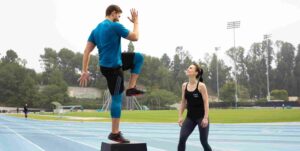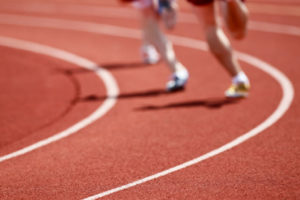In the world of sports, every athlete strives to reach the pinnacle of their abilities, to achieve their goals, and to outperform their own expectations. While natural talent and dedicated training play pivotal roles in an athlete’s journey, there’s an often-underestimated factor that can make all the difference – performance coaching. In this blog, we’ll explore the world of performance coaching for athletes, its significance, and the transformative impact it can have on your athletic career.
Contents
What Is Performance Coaching?
 Performance coaching is a specialized form of coaching that is tailored to help individuals, particularly athletes, maximize their potential and enhance their performance in their chosen field. It focuses on the holistic development of the individual. This not only addresses technical skills but also encompasses mental and emotional aspects that influence one’s performance. The primary objective of performance coaching is to identify and overcome obstacles, set and achieve goals, and continuously improve in pursuit of excellence.
Performance coaching is a specialized form of coaching that is tailored to help individuals, particularly athletes, maximize their potential and enhance their performance in their chosen field. It focuses on the holistic development of the individual. This not only addresses technical skills but also encompasses mental and emotional aspects that influence one’s performance. The primary objective of performance coaching is to identify and overcome obstacles, set and achieve goals, and continuously improve in pursuit of excellence.
This coaching involves a collaborative relationship between the coach and the athlete, where the coach provides guidance, feedback, and support to help the athlete reach their full potential. Whether in individual or team sports, performance coaching has proven to be a powerful tool in unlocking an athlete’s hidden capabilities and helping them achieve success at their highest level.
What Is The Significance Of Performance Coaching For Athletes?
The significance of performance coaching for athletes is profound and multi-faceted. It plays a pivotal role in an athlete’s journey by providing the following benefits:
- Maximizing Potential
Performance coaching helps athletes unlock their full potential by identifying and addressing weaknesses and untapped strengths. Coaches work closely with athletes to ensure they are continually improving their skills and abilities, pushing them to reach new heights in their athletic endeavors.
- Goal Achievement
Coaches assist athletes in setting clear, realistic, and measurable goals, both short-term and long-term. This process empowers athletes to stay focused, motivated, and committed to achieving their objectives, whether it’s winning a championship, breaking personal records, or improving their performance in specific areas.
- Mental Resilience
Performance coaching places a strong emphasis on mental training and emotional resilience. Athletes learn to develop a winning mindset, cope with pressure, manage stress, and maintain concentration during high-stakes situations. This mental fortitude is often the differentiating factor between success and failure in sports.
- Overcoming Barriers
Performance coaching helps athletes overcome mental and physical barriers that may hinder their progress. This includes addressing issues like performance anxiety, self-doubt, fear of failure, and any other obstacles that could impede peak performance.
- Accountability and Motivation
Coaches provide a support system that holds athletes accountable for their training and performance. This accountability, along with regular feedback and encouragement, serves as a powerful motivator to help athletes stay committed to their goals.
Overall, the significance of performance coaching for athletes is in its ability to bring out the best in them. It is a transformative partnership that can make the difference between a good athlete and a great one.
What Techniques Are Used In This Coaching Plan?
 Performance coaching for athletes employs a wide range of techniques and strategies to help individuals maximize their potential and achieve their goals. Here are some of the key techniques used:
Performance coaching for athletes employs a wide range of techniques and strategies to help individuals maximize their potential and achieve their goals. Here are some of the key techniques used:
Individualized Training Plans
Coaches create personalized training regimens that are tailored to the athlete’s unique strengths and weaknesses. This approach ensures that training is optimized for the athlete’s specific needs and goals.
Skill Development
Coaches focus on refining and perfecting an athlete’s technical skills, helping them become more proficient in their sport. This includes drills, exercises, and practice routines aimed at improving specific skills.
Mental Training
A significant part of performance coaching is mental training. Techniques such as visualization, mindfulness, positive self-talk, and stress management help athletes develop mental toughness, concentration, and emotional resilience.
Performance Analysis
Coaches use data and performance metrics to analyze an athlete’s progress. Video analysis, statistics, and feedback sessions are common tools for assessing performance and identifying areas for improvement.
Feedback and Communication
Effective communication between coach and athlete is essential. Coaches provide constructive feedback and encouragement to help athletes make adjustments and stay motivated.
Periodization
Coaches design training plans that incorporate periodization. This involves structuring training cycles to optimize performance at specific times, such as during competitive seasons or peak events.
Nutrition and Recovery
Performance coaching often covers the importance of proper nutrition and recovery techniques to support an athlete’s physical and mental well-being.
Video Analysis
Reviewing videos of an athlete’s performance can be a powerful tool for identifying areas for improvement in technique and strategy.
Visualization
Athletes are guided through visualization exercises to mentally rehearse their performances. And, helping to enhance confidence and mental preparedness.
Stress Reduction Techniques
Coaches may teach stress reduction techniques like meditation, yoga, or progressive muscle relaxation to help athletes manage stress and perform at their best.
These techniques are applied in a customized and holistic manner to address an athlete’s specific needs and goals. The combination of these strategies helps athletes continually progress, both in their physical abilities and their mental fortitude. Ultimately leading to improved performance and success in their respective sports.
How To Find The Right Performance Coach?
 Finding the right performance coach is a crucial step in your athletic journey. Here are some steps to help you find the right performance coaching for athletes:
Finding the right performance coach is a crucial step in your athletic journey. Here are some steps to help you find the right performance coaching for athletes:
- Research and Network
Start by researching coaches in your sport or discipline. Look for coaches with a strong track record and a reputation for producing successful athletes. You can also ask for recommendations from fellow athletes, trainers, or sports organizations.
- Credentials and Experience
Assess the coach’s credentials and experience. Look for coaches who have relevant certifications, qualifications, and experience working with athletes at your skill level. Coaches with a background in sports science or psychology can offer valuable insights.
- Check References
Don’t hesitate to ask for references from past or current athletes coached by the individual. Contact these athletes to learn about their experiences and the impact the coach had on their performance.
- Assess Communication
Effective communication is crucial in the athlete-coach relationship. Ensure that the coach is an excellent communicator and is willing to listen to your concerns, provide feedback, and adapt their coaching methods to your needs.
- Coaching Philosophy
Discuss the coach’s coaching philosophy and strategies. Ensure that their philosophy aligns with your values and objectives. It’s crucial that you share a common vision for your athletic development.
- Financial Considerations
Understand the coach’s fees and payment structure. Be clear about the cost of coaching services and whether they fit within your budget. Some coaches offer different pricing packages. So, explore your options.
- Track Record
Look for a coach with a proven track record of helping athletes achieve their goals. Eventually, this can be demonstrated through testimonials, success stories, or statistics related to the coach’s past work.
Remember that finding the right performance coach may take time and involve trial and error. It’s important to choose a coach who aligns with your goals and values and provides the support and expertise you need.
How To Get Started With Performance Coaching For Athletes?
 Getting started with performance coaching for athletes is an exciting and transformative step in your athletic journey. Here are some key steps to help you begin:
Getting started with performance coaching for athletes is an exciting and transformative step in your athletic journey. Here are some key steps to help you begin:
- Define Your Goals: Clearly articulate your athletic goals and objectives. Whether you’re looking to improve your skills, overcome mental barriers, or achieve specific milestones, having well-defined goals will guide your coaching experience.
- Initial Consultation: Contact potential coaches to schedule an initial consultation or evaluation session. This meeting will allow you to discuss your goals, assess the coach’s approach, and determine if there is a good fit between you and the coach.
- Establish Expectations: During the consultation, communicate your expectations and concerns with the coach. So, discuss what you hope to achieve through coaching, how frequently you want to meet, and any specific challenges you want to address.
- Customized Coaching Plan: Once you and the coach agree on your goals and expectations, the coach will develop a customized coaching plan. This plan will outline the strategies and techniques that will be used to help you achieve your objectives.
- Training and Feedback: Engage in regular training sessions with the coach. Be open to receiving feedback and guidance on improving your skills, mental resilience, and overall performance. The coach will provide support and monitor your progress.
- Consistency and Patience: Understand that performance improvement is a journey that requires consistency and patience. Be committed to the coaching process and trust that your efforts will yield results over time.
- Feedback Loop: Provide feedback to your coach regarding your experiences and how the coaching plan is working for you. This helps your coach make any necessary adjustments to the plan.
- Stay Committed: Stay committed to your coaching plan and put in the effort required to reach your goals. So, the journey may involve setbacks and challenges, but with dedication, you can overcome them.
Thus, performance coaching is an ongoing partnership. Hence, the journey may have its ups and downs. However, with dedication, the right coach, and a well-structured coaching plan, you can work toward unlocking your full athletic potential and achieving your goals.
Conclusion
In conclusion, performance coaching for athletes is a game-changer. It helps athletes reach their full potential, set and achieve their goals, and overcome challenges. By working with the right coach, athletes can improve their skills, build mental toughness, and see consistent progress. It’s all about finding the right fit, setting clear goals, and staying committed to the journey. With performance coaching, athletes have the support and guidance they need to excel in their sports and achieve success.
So, if you’re an athlete looking to take your game to the next level, consider performance coaching—it could be the key to your athletic dreams coming true. If you looking for online coaching MantraCoach is here to help. Book your free trial online coaching session now to connect with a specialist coach.


